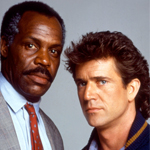
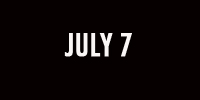 I already wrote about LETHAL WEAPON 2 along with the rest of the LETHAL WEAPON series back in 2014. I’m still happy with that review. It covers much of what’s relevant about the movie, and even features a scan from my beloved Summer 1989 Warner Brothers Catalog (as seen in the BATMAN review). But I didn’t think I should skip over the movie in this series because it’s such a crucial piece of what I’m talking about here. So the earlier review still stands, but here’s a partially overlapping supplemental look at LETHAL WEAPON 2 focusing on its place in the action movies of summer ’89.
I already wrote about LETHAL WEAPON 2 along with the rest of the LETHAL WEAPON series back in 2014. I’m still happy with that review. It covers much of what’s relevant about the movie, and even features a scan from my beloved Summer 1989 Warner Brothers Catalog (as seen in the BATMAN review). But I didn’t think I should skip over the movie in this series because it’s such a crucial piece of what I’m talking about here. So the earlier review still stands, but here’s a partially overlapping supplemental look at LETHAL WEAPON 2 focusing on its place in the action movies of summer ’89.
LETHAL WEAPON (1987) was of course a quintessential ’80s action movie, the Platonic ideal of a buddy cop picture, and one of the originators of the idea of Mel Gibson and producer Joel Silver (ROAD HOUSE) as action kings. But part 2 is more my idea of what “a LETHAL WEAPON movie” is like because it invented how to sequelize that movie and make it about the continuing adventures of that now-established friendship. It takes what was already seen as heightened and makes it bigger, sexier, funnier, lethal-er (apparently it’s the biggest body count in the series at 33), creating a template (and new character in Leo Getz, played by Joe Pesci a year before GOODFELLAS) that would be used for two more sequels in the ’90s.
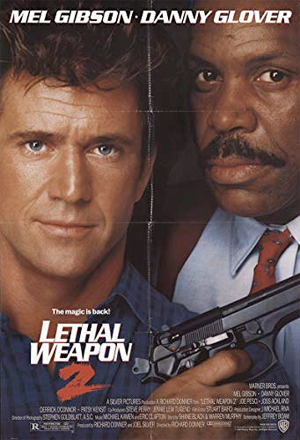 One obvious personnel connection to other movies of the summer is composer Michael Kamen (FOR QUEEN & COUNTRY, RENEGADES, ROAD HOUSE). Since the first LETHAL he’d become action’s premiere composer simply by scoring action’s premiere movie, DIE HARD. The score of LETHAL WEAPON was itself a buddy pairing between Kamen’s bombastic orchestra and Eric Clapton’s white-bluesy guitar noodling.
One obvious personnel connection to other movies of the summer is composer Michael Kamen (FOR QUEEN & COUNTRY, RENEGADES, ROAD HOUSE). Since the first LETHAL he’d become action’s premiere composer simply by scoring action’s premiere movie, DIE HARD. The score of LETHAL WEAPON was itself a buddy pairing between Kamen’s bombastic orchestra and Eric Clapton’s white-bluesy guitar noodling. For part 2 they add in smooth saxophonist David Sanborn, so in my opinion the sax represents Leo.
I don’t know – it fits the whole LETHAL WEAPON vibe. It works. But there’s something kinda comical about squawking saxophone used as a horror sting as one of our heroes is ambushed by attackers in ski masks.
(In other music news, this was the week that Milli Vanilli’s “Baby, Don’t Forget My Number” ceded the #1 spot to “Good Thing” by Fine Young Cannibals.)
An arguably more important connection: Paul Abascal was the hairstylist for both this and ROAD HOUSE. Abascal’s experience as one of the world’s greatest mullet wranglers famously led to him taking over as director on PAYBACK, and later directing the Mel Gibson produced action-star-avenges-sleazy-photographers thriller PAPARAZZI (which will always hold a dear place in my heart as the review that Titan’s legal department wouldn’t allow me to include in Yippee Ki Yay Moviegoer because it speculated that Gibson had committed a series of vigilante murders during the filming of this movie).
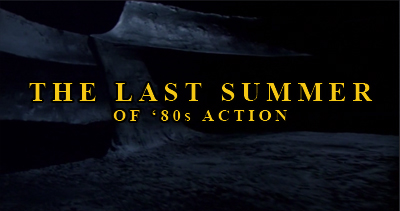 We started this review series with RED SCORPION, the Dolph Lundgren movie produced by Republican operatives in covert cooperation with the apartheid-era South African government and military to warn about the spread of communism in Africa. LETHAL director Richard Donner was also interested in putting political and social messages in his action movies. At the time there was concern about dolphins being killed by tuna nets, so the Murtaugh family is boycotting tuna (and Leo also apolitically talks about hating tuna sandwiches). The subplot about Murtaugh being embarrassed by his daughter (Tracie Wolfe) appearing in a condom commercial works as a riff on generational change and his uptightness, but I suspect Donner also wanted it in there for safe sex visibility, another thing that seemed somewhat progressive at the time.
We started this review series with RED SCORPION, the Dolph Lundgren movie produced by Republican operatives in covert cooperation with the apartheid-era South African government and military to warn about the spread of communism in Africa. LETHAL director Richard Donner was also interested in putting political and social messages in his action movies. At the time there was concern about dolphins being killed by tuna nets, so the Murtaugh family is boycotting tuna (and Leo also apolitically talks about hating tuna sandwiches). The subplot about Murtaugh being embarrassed by his daughter (Tracie Wolfe) appearing in a condom commercial works as a riff on generational change and his uptightness, but I suspect Donner also wanted it in there for safe sex visibility, another thing that seemed somewhat progressive at the time.
Most crucially, and most opposite of RED SCORPION, this is a movie where the violent-drug-dealers-protected-by-diplomatic-immunity villains are racist white South Africans. As I discussed in the other review, it’s amazing that this didn’t become a common action movie trope. Could movie producers have worried it would contradict their years of gleefully machine-gunning commies? As I noted before, the producers of RED SCORPION weren’t the only ones willing to look the other way and sing “Mary Had a Little Lamb” for the racists who are willing to help them out. Republicans including the Cheney family, while not openly supporting the horrendous racial segregation, called Nelson Mandela (played by Glover in a 1987 HBO movie) a terrorist, or claimed the divestment he called for would only hurt his people, and considered South Africa an ally in fighting communism. Though “communism” was the government’s smear for anyone who fought for racial equality.
To their credit, there were plenty of Republicans on the right side of history on this. Senator Richard Lugar, for example, helped organize 31 out of 64 Republican Senators to join all 47 Democrats in overriding Reagan’s veto of the Comprehensive Anti-Apartheid Act. Despite that loss, Reagan (who used the argument that apartheid was real bad but this was not the way to fight it) never complied with all the sanctions. His successor George H.W. Bush committed to full enforcement in ’89, almost definitely for sure I am positive because he saw LETHAL WEAPON 2 [citation needed].
I think Donner was right to assume everybody who wasn’t a fucking asshole could enjoy the idea of pro-apartheid villains. I did find one contemporary example of someone being offended by it, and it was some guy on a bulletin board who blamed the movie on the Jews – at least I think that’s what he means by “(((the usual hollywood suspects)))” – and wonders what Gibson, having had a “radical change of view against (((them))),” thinks of the movie now.
To non-fucking-assholes, though, there’s something beautiful about the ’80s’ most iconic black-white buddy duo fighting criminals who happen to be segregationists. I also love the gradual way they introduce the subject into the movie. When a car chase mysteriously leads to a trunkful of South African currency, and then there’s a seemingly unrelated run-in with South Africans, Riggs says, “South Africa. Home of the Krugerrand.”
To him it’s a clue. To Murtaugh it’s more personal. “Among other things,” he says.
In scenes at the South African Embassy, it becomes more explicit. Riggs holds an “END APARTHEID NOW” sign with protesters at the entrance to the building, though he’s only doing it as a means to stare down and intimidate the chief villain, Rudd (Joss Ackland, who played a Nazi in HITLER: THE LAST TEN DAYS and Russian in THE HUNT FOR RED OCTOBER and K-19: THE WIDOWMAKER). Murtaugh has a funnier scene where he pretends he wants to emigrate to South Africa, causing discomfort and confusion before launching into a righteous tirade.
In the end, Rudd is killed by his trailer full of money. A nice symbol for the divestment movement. We don’t need to trade with you fuckers. I don’t remember if part 3 ever addresses the fact that they went rogue and killed an ambassador. How did they get away with that?
A few unsourced claims on IMDb I found intriguing:
1. “Shown unscheduled on Australian television the night Nelson Mandela was elected President of South Africa.”
2. The movie played uncut in South Africa and was a hit
I’d really like to know if #2 is really true, but I couldn’t find any information about it. I did come across an archived episode of a show called South Africa Now that (starting at 17:35) reports on the movie using South African villains. But it doesn’t get into it at all, and I think it’s a show for southern African countries, not just South Africa. Another episode uses a clip of Murtaugh and Leo in the embassy alongside Jesse Jackson, DO THE RIGHT THING, Stetsasonic and Chuck D in a report on the trend of afrocentricity in the U.S. That was a cool time capsule.
I also found many references to later South African president F.W. de Klerk being inspired by Glover and the movie to begin dismantling apartheid, some even saying he used the phrase “one man, one vote” as a slogan after seeing Murtaugh use it in the movie. I’m skeptical, and could only find various repeats and paraphrases of the same trivia item, no original source. But the book Mandela: The Authorized Biography by Anthony Sampson at least references the movie as a sign of world opinion turning against the country. “And in the meantime the Afrikaners were becoming more isolated than ever, as the world’s scapegoats: in a blockbuster movie of 1989, Lethal Weapon 2, the villains had Afrikaner accents.”
I still really like this movie, and it’s fun to be able to root for diversity and against racial oppression through the medium of action movie. But I gotta admit it’s a little disingenuous, or at least naive, as presented, and not because of Gibson’s later infamy. There are a bunch of scenes about workplace camaraderie: people at the station joking around, playing pranks on each other, making silly bets, getting together for poker. I love that in the scene where the cops taunt Murtaugh by leaving a condom-covered tree on his desk, after they walk away his anger melts away and he laughs about it. These scenes organically set us up for later events (the upsetting assassinations of a bunch of these officers, the ability of Riggs to escape bondage by dislocating his shoulder), but they’re also just a fun, feel good portrayal of white and black officers who love, respect and count on each other.
And I’m sure there’s some truth to that, but less than two years after this the beating of Rodney King woke those who were sleeping to horrendous racial issues in the real life Los Angeles Police Department – problems that have continued to repeat themselves in other departments around the country for decades. So let’s not get too cocky here, America.
Also, there’s a line where the South Africans’ money stash is referred to as “Millions! Billions! A fuckin Donald Trump lotto!” Kind of ironic today, since Trump and his party have been so dedicated to securing minority rule in America through voter suppression, gerrymandering and rigging the census against “Democrats and non-Hispanic whites.”
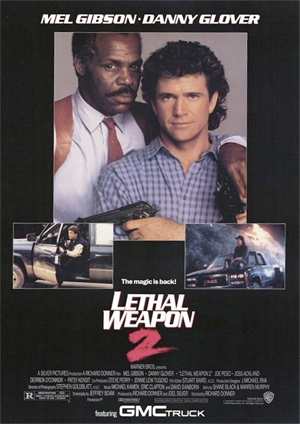 Original screenwriter Shane Black gets a “story by” credit (along with REMO WILLIAMS novelist Warren Murphy), but his script was famously too dark for Donner. It has not been leaked, but it is known to have had Riggs sacrificing his life to save the Murtaugh family. Black has said it had Leo (but only in one scene), and it had Riggs pulling down the stilt house. Interestingly, it was Jeffrey Boam who did the many rewrites to make it more light-hearted. That’s the same guy who wrote INDIANA JONES AND THE LAST CRUSADE, so he had a pretty good summer.
Original screenwriter Shane Black gets a “story by” credit (along with REMO WILLIAMS novelist Warren Murphy), but his script was famously too dark for Donner. It has not been leaked, but it is known to have had Riggs sacrificing his life to save the Murtaugh family. Black has said it had Leo (but only in one scene), and it had Riggs pulling down the stilt house. Interestingly, it was Jeffrey Boam who did the many rewrites to make it more light-hearted. That’s the same guy who wrote INDIANA JONES AND THE LAST CRUSADE, so he had a pretty good summer.
Not only that, but KARATE KID PART III screenwriter Robert Mark Kamen claims to have done some script doctoring on it. Although many sources refer to the villains in Black’s script as South African, Kamen told our friend Fred Topel (in the same interview I quoted for KK III) that it was his idea:
I wrote on lots and lots of films where I took no credit. Lots. But I did this for five years at Warner Bros. On Lethal 2, the whole idea of the South African villains was all my stuff because I had just come back from South Africa researching this film The Power of One that I wrote.
He later received credit on LETHAL WEAPON 3, so at least part of his story seems to check out.
Like LAST CRUSADE, this sequel is largely constructed of funny character bits stringing together a series of spectacular stunt sequences. Instead of flying around the world they’re just driving around L.A., but it opens with a big car chase, it has a fall from a tall hotel into a swimming pool, Murtaugh shoots a guy with an overly established nail gun, his toilet explodes, Jeanette Goldstein (ALIENS) gets blown up on a diving board, Riggs is attacked by machine gun guys in a helicopter, and he yanks that house down with his pick up truck, among other things. One cool stunt I noticed involves Riggs running and climbing onto a moving tow truck. It looks like it’s a stuntman and then Gibson in the same shot? And then Gibson for real on a moving truck.
Stunt coordinator (and Gibson double, as shown in that WB catalog) Mic Rogers had previously doubled Gibson in LETHAL WEAPON and TEQUILA SUNRISE. He also did stunts in ROAD HOUSE. In addition to sticking with Gibson for BIRD ON A WIRE, LETHAL WEAPON 2 and 3, BRAVEHEART, CONSPIRACY THEORY, PAYBACK , THE PATRIOT and APOCALYPTO, he was the stunt coordinator for THE FAST AND THE FURIOUS and director of UNIVERSAL SOLDIER: THE RETURN. ROAD HOUSE’s Charlie Picerni is also credited as stunt coordinator.
Cinematographer Stephen Goldblatt (THE HUNGER, THE COTTON CLUB, BATMAN & ROBIN) was actually born in South Africa, but moved to London as a child.
Legacy:
Followed by two sequels and a recast/reboot TV series. Boam went on to write THE PHANTOM. In 1990, Glover starred in PREDATOR 2, also produced by Silver. Apartheid ended in 1994.



























July 17th, 2019 at 11:49 am
My favorite thing about Lethal Weapon 2 is that Riggs threatens to fuck the villains on more than occasion.